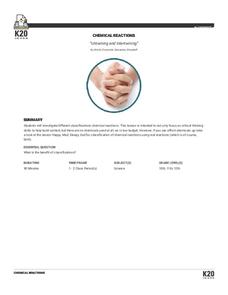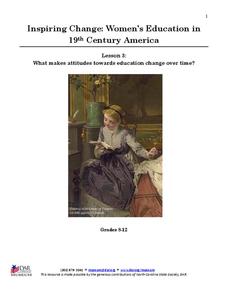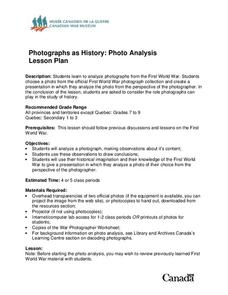NOAA
Deep-Sea Ecosystems – A Tale of Deep Corals
Many have debated which came first, the chicken or the egg, but this lesson debates which came first, the hydrocarbons or the carbonate reef. After a discussion on deep-sea corals, scholars receive a set of questions to research and...
K20 LEARN
Untwining And Intertwining: Chemical Reactions
What happened when the chemistry teacher told a bad joke? There was no reaction! A creative take on the traditional reaction types lesson invites learners to draw their own conclusions about how compounds and elements combine. Groups...
Edgate
Great Grids
Learners use grid boxes as a measurement tool and discover how grids are used for mapmaking and scaling down an area. They begin by attempting to draw a model shape drawn by the teacher by using the gridding process. At the conclusion of...
Curated OER
As You Like It
Students use online resources in order to examine patterns of imagery in As You Like It. By comparing these patterns to those of other Shakespeare plays, students draw conclusions about the different reasons Shakespeare uses imagery in...
Curated OER
OBSERVING THE ROLES OF MALES AND FEMALES IN THE NURTURING OF THE YOUNG THROUGHOUT THE ANIMAL KINGDOM
Pupils watch animal videos to identify and compare the male/female roles of different species of animals. They draw conclusions and compare those roles to those of humans. They discuss how the human male/female roles have changed...
Curated OER
A Sense of Place
High schoolers evaluate stories, customs, and pieces of literature and draw conclusions about people who have lived in New Mexico. They analyze how water helps define the character of an area.
Curated OER
Water Pollution Lesson Plan: Don't Trust Your Eyes
Students develop a list of actions they could perform that would protect our water resources from pollution. They formulate hypotheses, conduct experiments and draw conclusions about actual pollutants found in our water supply.
Kenan Fellows
Engineering Skills Through Problem Based Learning
Navigate the ups and downs of learning about energy. Future engineers consider how potential and kinetic energy apply to roller coasters. They design a roller coaster of their own and then use computer design software to showcase their...
Curated OER
Daily Lives of Slaves - What Really Happened?
Learners explore the varieties of slave life in antebellum America. They research various sources to examine the relationships between masters, overseers, and plantation hands. Students identify and describe the conflicts between...
Curated OER
Why Does It Matter? Teaching Tolerance in an Unforgiving Society
Young scholars listen to the song "Scarecrow" by Melissa Etheridge and draw what they think the song is about. They discover the song is about a man who was attacked. They again express their feelings about the song through drawing. ...
National Society Daughters of the American Revolution
Lesson 3: What Makes Attitudes Towards Education Change over Time?
The struggle for women's rights is not unique to this generation, or even to the 20th century. Class members explore the conflicting opinions of Alexander Graham Bell and his wife, Mabel Hubbard Bell, regarding women's pursuits of higher...
Curated OER
Making Connections
Learners identify the main ideas in a passage from literature, and in a painting, and justify their conclusions using logic and language arts skills.
Carolina K-12
Battle Behind the Pumps
After considering the role that gasoline plays in our lives and our dependence on it as a society, learners participate in a reading activity discussing why oil prices are increasing. They will then simulate being members of a committee...
Curated OER
Ecological Cycles Part 1
Knowing about the hydrologic cycle is the first step to understanding the carbon cycle. Upper graders discuss the earth's water content, polar ice caps, and the concept of the ecological cycle as it applies to carbon, nitrogen, and other...
Curated OER
The Rise and Fall of Joseph McCarthy
Learners analyze documents, cartoons, speeches and articles about Joseph McCarthy and his crusade against "Un-American" activities. They guide their research with a worksheet and participate in class discussions about their findings.
NASA
Decomposers Get Energy From Dead Things
When life gives you mold, make penicillin. Scholars design an inquiry experiment to determine what causes rotting and mold growth. It also covers decomposers and the important role they play for other living things.
Alabama Department of Archives and History
Strange Fruit: Lynching in America
To continue their study of the Civil War, Reconstruction, and the beginning of the civil rights movement, class members watch the YouTube video of Billie Holiday singing "Strange Fruit" as an introduction to an examination of lynching in...
Robert F. Kennedy Center for Justice and Human Rights
Juliana Dogbadzi: Slavery/Trafficking
Progress your learners' comprehension of universal human rights by exploring the violation of human trafficking through the experiences of Juliana Dogbadzi. This activity analyzes and discusses very sensistive and graphic issues but is...
Facing History and Ourselves
Hands Up, Don't Shoot!
Why is it so difficult to develop a clear understanding of the events surrounding the shooting of Michael Brown by a Ferguson, Missouri, police officer? To answer this question class members listen to a NPR discussion of the findings of...
Science 4 Inquiry
Enzymes in Action
Enzymes play a role in almost every function in the human body. Scholars explore three variables related to the use of enzymes. They observe a catalase reaction, experiment with substrates, and examine reactions rates.
College Board
Civic Knowledge and Action in AP U.S. Government and Politics
Vote, it's your civic duty! The high school lesson focuses on voter turnout and civic participation with a series of activities. Young scholars analyze data to discover voter turnout trends, complete worksheets, and participate in group...
Curated OER
Abraham Lincoln, the 1860 Election, and the Future of the American Union and Slavery
Young scholars examine the political alternatives regarding the spread of slavery and the preservation of the American union facing the American people in the decade leading up to the 1860 presidential election.
Canadian Museum of Civilization Corporation
Photographs as History
Imagine being a war photographer embedded in World War I. How do you see your role? How might your photos influence that study of the war? Of history? Class members select a photograph, adopt the perspective of the photographer, and...
National Arts Centre
Visual Metaphors in Scenic Design: Activity
As part of a study of how visual metaphors are used in set design, class members examine an image of designer Josef Svoboda's 3-D scale model for the opera Idomeneo, re` di Creta. They then find another example that employs a visual...
Other popular searches
- Nonfiction Draw Conclusions
- Draw Conclusions in Reading
- Draw Conclusions Lesson
- Draw Conclusions Reading
- How to Draw Conclusions
- Infer and Draw Conclusions
- Draw Conclusions in Literacy
- Draw Conclusions in Fiction
- Fiction Draw Conclusions
- Draw Conclusions Worksheet

























